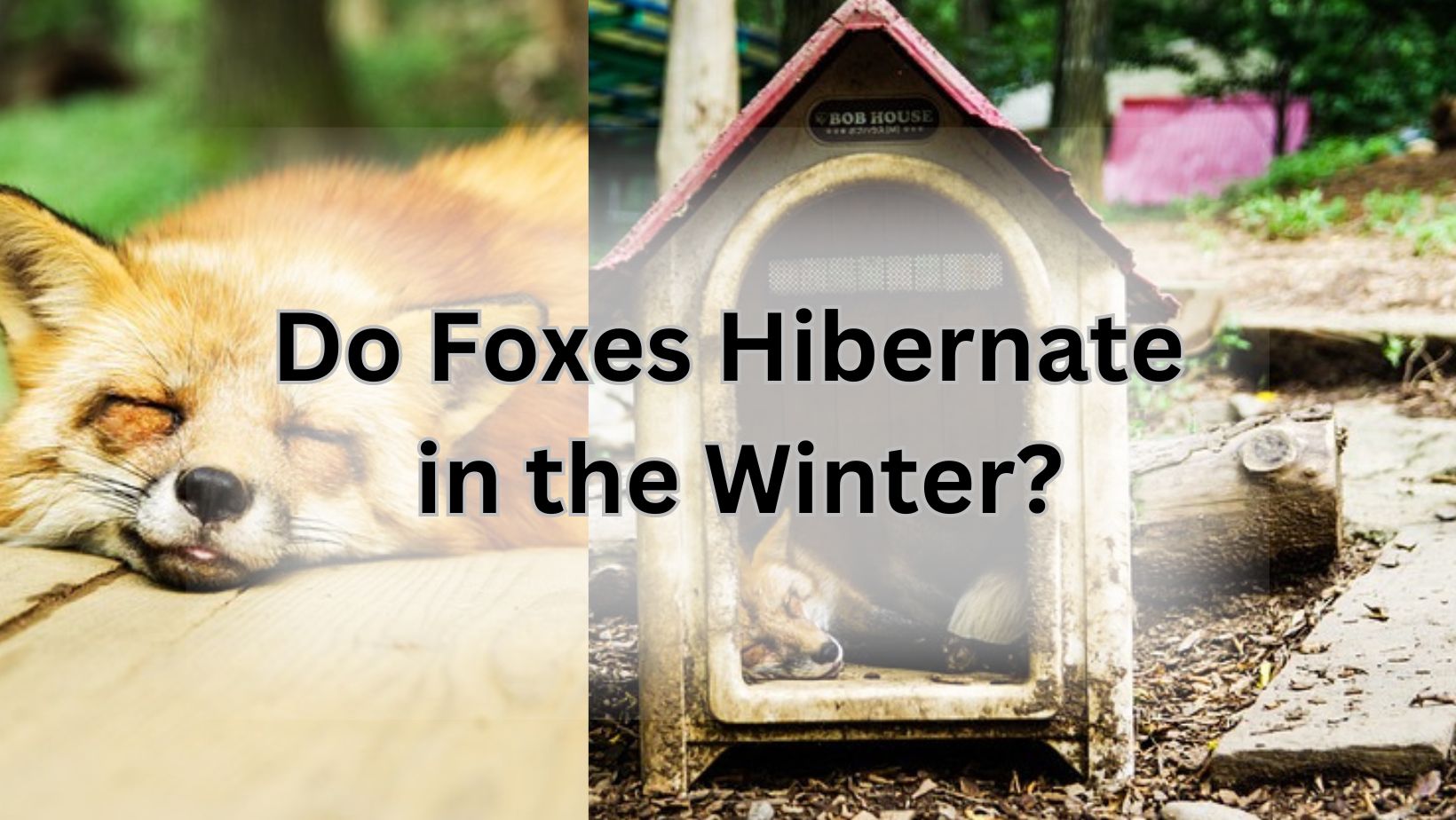Do Foxes Hibernate in Winter? Find Out Now!

Do Foxes Hibernate in the Winter?
Yes, foxes do not actually hibernate in the winter like some other animals do. Instead, they have some fascinating survival strategies to endure the cold months. Let’s dive into the world of foxes and explore how they navigate the winter wonderland without hitting the snooze button on life.
The Basics of Fox Behavior in Winter
During the winter, foxes remain active and continue to hunt for food. They may change their hunting habits to adapt to the harsh conditions, such as scavenging for food or preying on smaller animals like rodents.
Understanding Hibernation Patterns
While foxes do not hibernate, they may become less active during extreme cold spells and conserve energy by staying in their dens for longer periods. This behavior helps them stay warm and preserve their energy reserves.
Importance of Winter Survival for Foxes
Winter survival is crucial for foxes as they need to maintain their body condition to ensure they can reproduce successfully in the spring. By staying active and adapting to the winter conditions, foxes increase their chances of survival and passing on their genes to the next generation.
Fox Adaptations for Winter
Do foxes hibernate in the winter? That’s a question that often pops up when we think about these cunning creatures and how they survive the cold season. Well, let me tell you, foxes don’t actually hibernate during winter, but they do have some pretty nifty adaptations to help them brave the chilly temperatures.
Thick Fur and Winter Coat Evolution
One of the key adaptations that foxes have for winter survival is their thick fur and winter coat evolution. These fluffy critters have a double-layered fur coat that helps insulate them from the cold. The outer layer is made up of long guard hairs that repel water and snow, while the inner layer is dense and soft, providing excellent insulation to keep them warm and toasty.
Changes in Fox Diet during Winter
During the winter months, food can be scarce for foxes, so they have to adapt their diet to survive. While they typically hunt small mammals like rodents and rabbits, in winter, they may also scavenge for fruits, berries, and even insects to supplement their diet. This flexibility in their food choices helps them stay nourished when their usual prey is harder to come by.
Behavioral Adjustments for Cold Weather
Foxes are known for their clever and adaptable nature, and this comes in handy during the winter months. Instead of hibernating like some other animals, foxes remain active throughout the winter, using their keen hunting skills to find food and survive the cold. They may also dig burrows or find sheltered spots to keep warm and avoid harsh weather conditions. So, while they may not hibernate, foxes definitely have some tricks up their sleeves to make it through the winter season.
Factors Influencing Fox Hibernation
Do foxes hibernate in the winter? Well, let’s dive into the factors that influence whether these sly creatures decide to catch some Z’s during the chilly season.
3.1 Impact of Geographic Location
When it comes to fox hibernation habits, geographic location plays a significant role. Foxes living in colder regions with harsh winters are more likely to hibernate compared to those residing in milder climates. The availability of food sources and temperature variations can also influence their decision to hibernate.
3.2 The Role of Fox Species in Hibernation
Not all fox species have the same hibernation patterns. While some species may enter a state of torpor during the winter months, others remain active throughout the season. For example, Arctic foxes have adapted to the extreme cold by developing thicker fur coats and are known to be active year-round.
3.3 Environmental Conditions and Hibernation Triggers
Environmental conditions such as food scarcity and temperature drops can act as triggers for foxes to hibernate. When food sources become scarce during the winter, foxes may choose to conserve energy by entering a state of hibernation. Additionally, extreme cold temperatures can also prompt foxes to seek shelter and hibernate until conditions improve.
Fox Hibernation Myths Debunked
Common Misconceptions about Fox Behavior
Do foxes hibernate in the winter? That’s a question that has baffled many wildlife enthusiasts. Let’s clear the air on this one. Contrary to popular belief, foxes do not actually hibernate during the winter months. These cunning creatures are not ones to hit the snooze button and sleep the cold months away. Instead, they have some tricks up their furry sleeves to survive the harsh winter conditions.
Clarifying the Difference Between Hibernation and Torpor
Before we dive deeper into the winter habits of foxes, let’s talk about hibernation versus torpor. While hibernation involves a deep state of sleep where an animal’s metabolic rate significantly drops, torpor is more of a temporary state of decreased activity and metabolic rate. Foxes exhibit torpor during extreme weather conditions, allowing them to conserve energy without entering a full hibernation mode.
Instances of Limited Hibernation in Foxes
Although foxes do not hibernate in the traditional sense, there have been instances where they exhibit limited hibernation-like behavior. In some cases, foxes may find a cozy den to curl up in during particularly harsh winter days, reducing their activity levels to conserve energy. However, these periods of decreased activity are not as prolonged or deep as true hibernation.
Winter Survival Strategies of Foxes
Winter Survival Strategies of Foxes
Burrowing Habits and Shelter Choices
Foxes are clever little critters when it comes to surviving the winter chill. Instead of hibernating like some other animals, foxes rely on their burrowing habits and shelter choices to stay warm and cozy during the cold months. These cunning creatures often dig burrows in the ground or find shelter in dens to escape the harsh winter weather. It’s like they have their own little underground Airbnb!
Utilization of Stored Food Reserves
Foxes are not ones to rely on food delivery services during the winter. Instead, they are resourceful hunters and gatherers who make good use of their stored food reserves. These sly animals stash away extra food during the warmer months to ensure they have enough to eat when food is scarce in the winter. It’s like they have their own little pantry stocked with goodies!
Social Dynamics in Fox Communities during Winter
While some animals prefer to go into hibernation solo, foxes are social butterflies even in the winter. These furry friends often stick together in communities, sharing warmth and resources to survive the cold season. It’s like they have their own little winter wonderland party going on! So, next time you see a fox frolicking in the snow, remember that they have some cool survival strategies up their furry sleeves.Understanding Fox Torpor
Do foxes hibernate in the winter? Well, let’s talk about fox torpor, a fascinating survival mechanism that these clever creatures employ when the cold season rolls around. Torpor is like a winter vacation for foxes, but instead of sipping margaritas on a sunny beach, they’re snuggled up in their cozy dens, conserving energy like pros.
Torpor as a Survival Mechanism
Foxes enter torpor as a way to cope with the harsh winter conditions. This state of reduced metabolic activity helps them conserve energy when food is scarce and temperatures drop. It’s like hitting the snooze button on life until things get a bit more bearable.
Physiological Changes during Torpor
During torpor, a fox’s heart rate slows down, its body temperature drops, and its overall activity decreases significantly. This allows them to survive on minimal food and endure the winter months without burning through all their energy reserves. It’s like putting your phone on airplane mode to save battery life.
Frequency and Duration of Torpor Episodes
While some fox species may enter torpor more frequently and for longer periods, others may only experience it occasionally. It all depends on factors like food availability, weather conditions, and individual health. Think of it like deciding whether to binge-watch a whole series in one sitting or spread it out over a few weekends.
Fox Hibernation vs. Other Animal Hibernation
Do foxes hibernate in the winter? Well, let’s dive into the fascinating world of hibernation and explore how our sly, cunning friends, the foxes, handle the chilly winter months. While some animals like bears and squirrels are known for their deep winter slumber, foxes have a unique approach to surviving the cold.
Contrasting Hibernation Patterns Across Species
Unlike bears who go into a deep hibernation where their body temperature drops significantly, foxes enter a state of dormancy where they are less active but can still move around and hunt for food. This allows them to conserve energy while still being able to survive the winter months.
Unique Adaptations in Foxes Compared to Bears and Squirrels
Foxes have adapted to their environment in clever ways. They store extra food in hidden caches to ensure they have enough to eat during the winter. They also grow thicker fur to keep warm and may even change their diet to include more high-energy foods to sustain them through the cold season.
Ecological Significance of Fox Hibernation
While some may think that foxes hibernate to escape the winter, their behavior actually plays a crucial role in the ecosystem. By staying somewhat active during the winter, foxes help control the population of small rodents and insects, which can become a problem if left unchecked. So, next time you see a fox out and about in the snow, remember that they’re not just surviving, they’re also doing their part to maintain a healthy balance in nature.
Human Impact on Fox Hibernation
Urbanization and Disruption of Fox Habitats
Now, let’s talk about how us humans are messing with the foxes’ winter snooze fest. Urbanization is like that annoying party guest who crashes the hibernation party. As we expand our cities and towns, we encroach on the natural habitats of these cunning creatures. With less space to call their own, foxes struggle to find suitable spots to hunker down for the winter.
Climate Change and Its Effects on Fox Hibernation
Oh boy, here comes the big bad wolf of the story – climate change. As temperatures rise and winters become milder, foxes are left scratching their furry heads. Their internal hibernation clocks get all messed up, leading to confusion and chaos in the fox community. It’s like trying to sleep through a rock concert – not easy, my friends.
Conservation Efforts to Preserve Fox Hibernation Spaces
But fear not, fellow nature lovers! There are heroes out there fighting the good fight to protect our fox friends. Conservation efforts are underway to preserve the precious hibernation spaces of these sly creatures. By creating safe havens and wildlife corridors, we can ensure that foxes have a cozy spot to catch some Z’s during the chilly winter months.
Observing Fox Hibernation in the Wild
Responsible Wildlife Watching Practices
Winter is a magical time for observing fox hibernation in the wild, but it’s important to do so responsibly. Remember, we are guests in their home, so always maintain a safe distance and avoid disturbing these beautiful creatures during their winter slumber.
Popular Spots for Fox Hibernation Sightings
If you’re eager to catch a glimpse of foxes hibernating in the winter, head to areas with dense vegetation like forests, where these clever creatures seek shelter and warmth during the cold months. Keep your eyes peeled for cozy dens tucked away in the snow!
Tips for Ethical Fox Observation in Winter
When observing fox hibernation in the winter, remember to respect their space and avoid making loud noises or sudden movements that could startle them. Patience is key when waiting for these elusive animals to emerge from their dens, so take your time and enjoy the peaceful winter wonderland around you.
Conclusion: Coexisting with Foxes in Winter
Balancing Human Activities and Fox Habitats
As winter blankets the land in its chilly embrace, foxes retreat into their cozy dens to weather the cold months ahead. But as we humans go about our daily lives, it’s important to remember that these furry creatures share our world too. By being mindful of their habitats and the impact of our actions, we can ensure that foxes have a safe haven to hibernate in peace.
Conservation Awareness for Fox Protection
With their fluffy tails and keen eyes, foxes are a sight to behold in the winter landscape. However, their populations are facing threats from habitat loss and human activities. By raising awareness about fox conservation and supporting initiatives to protect their habitats, we can help these cunning creatures thrive in the winter wonderland.
The Delicate Ecosystem Role of Foxes in Winter
While foxes may seem like elusive creatures, they play a crucial role in the delicate balance of the winter ecosystem. From controlling rodent populations to dispersing seeds, these clever canids are nature’s unsung heroes. By appreciating their contribution to the winter ecosystem, we can learn to coexist harmoniously with these wild beings.
So next time you spot a fox frolicking in the snow or curling up in its den, remember that they too have a place in the winter world. By respecting their habitats, raising awareness about their conservation, and appreciating their role in the ecosystem, we can ensure that foxes continue to enchant us with their winter magic for generations to come.



